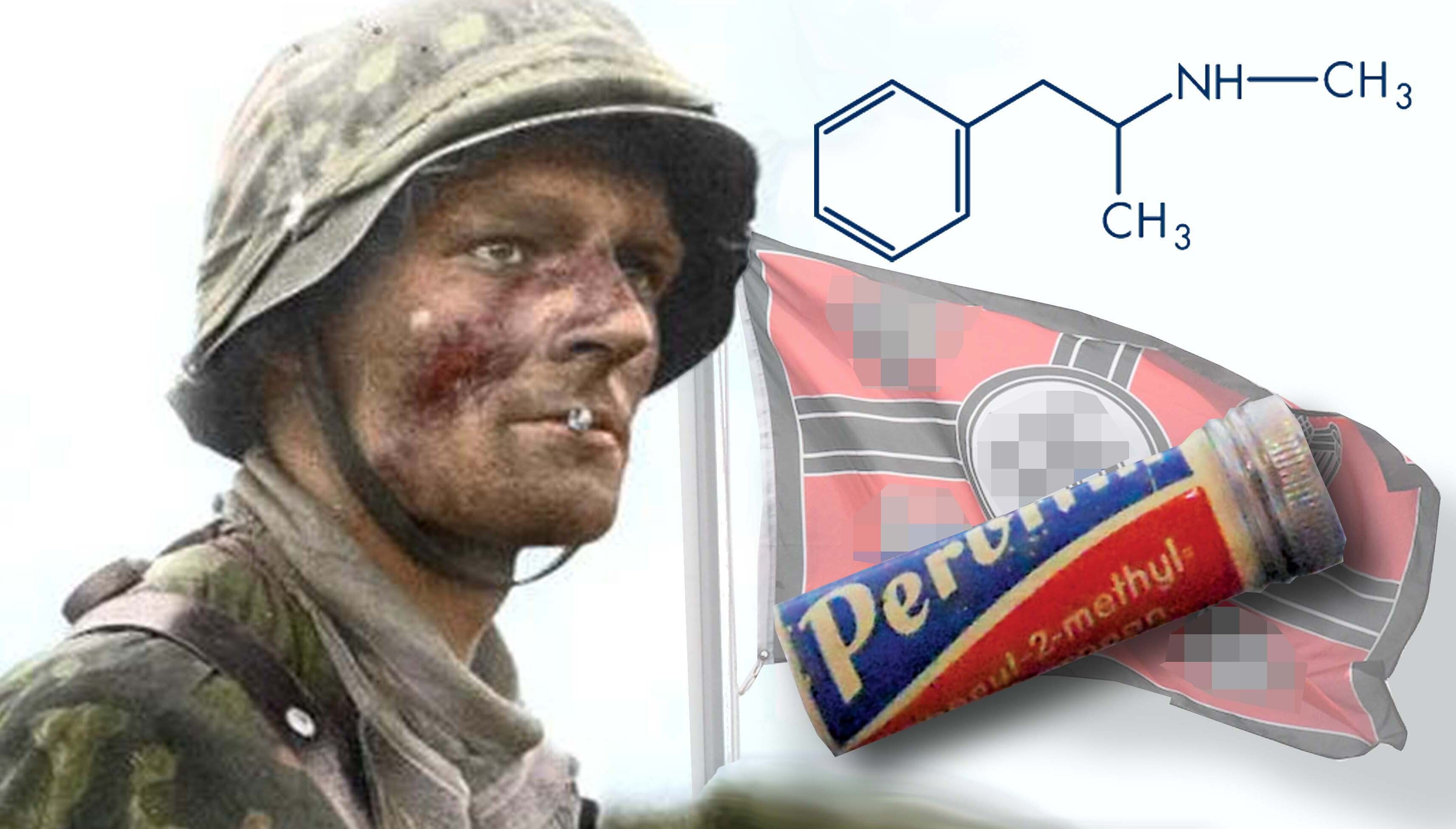Nazi Meth Zombies: Drug Use by the Third Reich
The use of Pervitin – basically pure crystal meth – was pervasive throughout the Nazi regime, from high commanders all the way down to German soldiers fighting in the field. In this episode, we explore the use of meth by the Nazis and how it helped – and hurt them in World War II. Then we catch up with Comedian and Screen Writer, Jay Black!

There’s this famous clip of Adolf Hitler. He’s sitting at the 1936 olympics and just clearly tweaking on some sort of drugs. He’s rocking back and forth, tapping his hand on his leg, shaking and just clearly on drugs. I’m sorry if this ruins the squeaky clean image you had of the guy.
So let’s go back in time to the period in Germany after the first World War. Germany had a drug problem. Many war veterans were addicted to morphine. And morphine, along with opium and heroin, ran rampant throughout what was then the German Weimar Republic. These drugs were actually a huge source of revenue in Germany, many of them being manufactured as pain killers and cough medicine. This widespread drug abuse in Germany continued as the Nazi party took control in the 1930s. But the Nazis had this vision of Germans as being pure of body and mind. And we know that this led to horrible eugenics and genocide. But it also led the Nazi party to take a prohibitive view of things alcohol and tobacco, and some drugs. The Germans were some of the first to do research on the harmful effects of smoking. And while it doesn’t seem like smoking decreased very much in light of these policies, the official stance of the nazi party was anti-smoking. Alcohol was a problem too, and was eventually warned about within Germany. This was particularly true after the Nazis invaded France and drinking was seen to be out of control. Before then, alcohol consumption among Nazi soldiers was actually encouraged as long as it didn’t lead toward public drunkenness. But after the invasion of France, Hitler saw this becoming an issue and stated that he expected that “members of the Wehrmacht who allow themselves to be tempted to engage in criminal acts as a result of alcohol abuse will be severely punished.” He said offenders could expect “a humiliating death.” That too didn’t seem to really keep the Nazis from drinking.
Like alcohol and tobacco, drug laws were enforced as well. One of the first laws passed in Nazi Germany was to imprison drug addicts for up to 2 years. A propaganda tool used to discourage drug use was by associating it with a part of the population that was being demonized. They told the public that only those of Jewish descent used drugs. This was at the time when they were also telling the German public that they had the Jews to blame for all of their problems.
But when it comes to one particular drug, one of the reasons that it really was never discouraged is because they didn’t see meth as a drug. Hitler himself, despite promoting the vision of “pure, healthy Germany” was in fact a drug addict. The fact that he didn’t smoke or drink was heavily promoted, but he was on more than 90 medicines daily, and more than a dozen of those were heavy narcotics. He had health issues, including chronic dysentery and his personal doctor, Dr. Theo Morell injected him with steroids, cocaine and opiates in en effort to allow him to sleep. Toward the end of the war, the generals around Hitler knew that this was a problem and actually took a disliking toward Dr. Morell, because they saw Hitler’s mental health declining.
After a bomb went off in Hitler’s Headquarters in July of 1944 – a failed assassination attempt – the leader of the Nazi party was badly wounded with hundreds of splinters in his body and busted eardrums. Just two hours later, he had a meeting with Italian Dictator Mussolini. But when he was injected with Eukodol, which was basically like oxycodone mixed with cocaine, he felt no pain at all. Mussolini hoped to use the meeting to back Italy out of the war. But Hitler spoke for several hours while Mussolini sat in a chair suffering from back pain.
It wasn’t just Hitler who was addicted to drugs. It was a lot of Germany at the time.
Throughout Germany in the 1930s, you would see billboards promoting this miracle pill for stamina, courage and morale. It was called Pervitin – and its use was incredibly widespread – especially within the military. But it was taken in large by the German public – everyone from businessmen looking for a couple extra hours of energy to menopausal women took Pervitin with no restrictions. It was seen as a simple pep pill. Something to get you through the day. And when taken in large amounts, something that could help a soldier into battle. And it was pure methamphetamine. That’s right. The Nazis were fueled by meth.
The Nazi party had this slogan “Germany, Awake!” And the miracle pill, Pervitin had the power to do just that. And while alcohol or drugs that were downers were seen to slow down the mental acuity of the Nazis, taking pure speed in the form of Pervitin gave them the confidence and courage they needed to go into battle. It was marketed by a German pharmaceutical company named Temmler in 1937 and they used a marketing plan modeled after Coca Cola to reach the public. Doctors were sent samples and lauded the drug’s positive affects, completely ignoring it’s adverse affects.
In fact, many of the Nazis early victories in World War II are often attributed in part to the widespread use of these drugs. It assisted the soldiers in invading Poland. German commanders wrote about how effective it was in helping the soldiers in battle. They claimed that “everyone was fresh and cheerful with excellent discipline. A slight euphoria and increased thirst for action, mental encouragement, very stimulated, no accidents, long lasting effect.” Another report said that it gave their troops a vigorous urge to work as the feeling of hunger subsides.” This allowed the German army to march for days on end with little sleep and empty stomachs. It was a performance enhancing drug. It assisted them through the French Ardennes in 1940 and through 11 days without rest or food in the Balkan Campaign of 1941. At this point in the war, the use of the methamphetamine wasn’t just encouraged, it was mandated.
In 1940, 35 million units of Pervitin were shipped to the front lines. There are letters that have been preserved in which German troops are writing home, begging for their families to send them more Pervitin.
But by 1941, the adverse effects of the drug were finally starting to be acknowledged. They knew that if you took 4 tablets, you would start hallucinating and would be no good in battle. They also knew that more and more soldiers were experiencing heart problems. Others were committing suicide because of drug-induced psychotic phases. The thing that really got the attention of Nazi leaders, however, was the dependency that the soldiers had now developed. Without the drug, they were worse than useless. Among the general population, the drug was banned from non-prescription sales. But in the military, they couldn’t cut their soldiers off from it without destroying their strength. Even with continued use of Pervitin, the German army began seeing its adverse affects. Poor decision making, irrational actions, suicides and poor health were the problems that occurred down the ranks. For German submariners fighting in U-Boats, a cocaine-laced chewing gun was distributed that often led to extreme paranoia, claustrophobia and mental breakdowns.
But at the top, Hitler’s own drug use – and perhaps the drug use of his top commanders, were leading to horrible strategic decisions. There are a few bad decisions that helped the Allies to win World War II. Hitler’s hate-filled ideologies caused him to join forces with Italy, which greatly damaged their chances in the war. Overconfidence in Russia and the failure to take Moscow, and the disastrous decision to fight a war on two fronts. But when it comes to the late stages of the war, the invasion of Normandy, the Battle of Kursk, we can possibly attribute Hitler’s blunders to an overconfidence in some areas and lack of confidence in others – he was a drug addict and had no grasp of reality at that point. And he was fighting with an army that was also drug-addicted, fueled by meth to cure their hunger and fatigue. They were an army of meth-fueled zombies. The Internet says it’s true.
Review this podcast at https://podcasts.apple.com/us/podcast/the-internet-says-it-s-true/id1530853589
Bonus episodes and content available at http://Patreon.com/MichaelKent
For a special discount at SCOTTeVEST, visit http://theinternetsaysitstrue.com/deals


